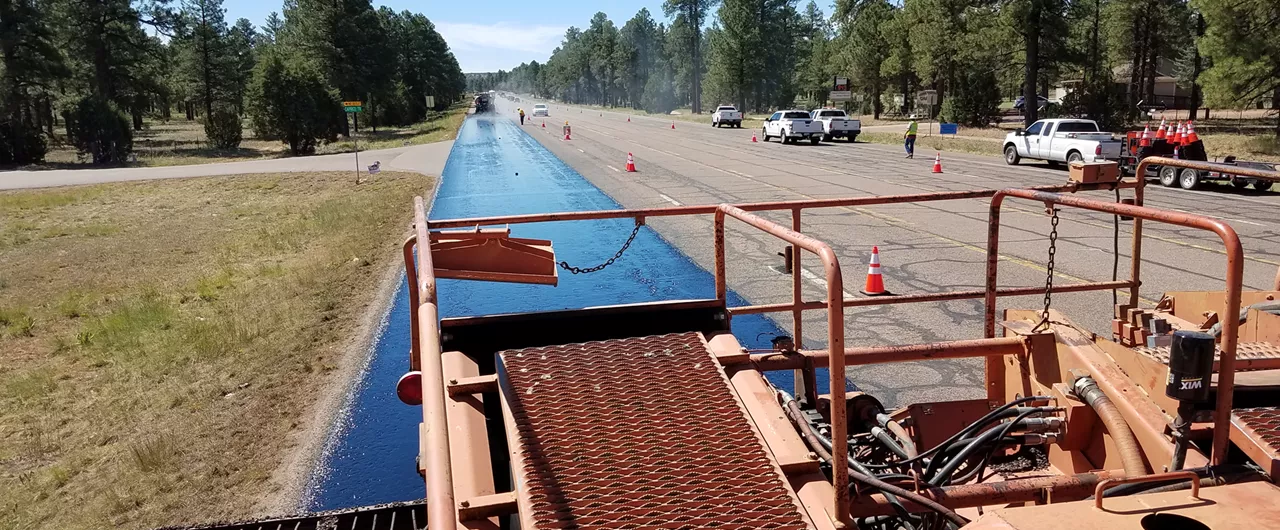A Job for Cape Seal
After careful consideration of treatments to meet ADOT’s desire to extend the service life of 32 lane miles of SR-260, it was decided that a cape seal treatment would be the best solution. Cape seals are combination treatments that help reduce moisture intrusion and provide a durable wearing course.
The SR-260 cape seal project was bid at a cost of approximately $6 per square yard. A hot-applied chip seal would be applied as the first course, followed by either a micro surfacing or slurry seal for the wearing course, depending on access to other routes. Micro surfacing would be designated for use to provide more durability in areas where that access exposes the surface to lateral forces from braking and turning. Conventional slurry seal would be applied in areas that were subjected to less stress. By utilizing both the micro surfacing and slurry seal treatments, ADOT would be able to evaluate the performance of each for future use in similar scenarios.
FHWA Pilot Project
The SR-260 cape seal was selected as the pilot project for the Federal Highway Administration (FHWA) Every Day Counts (EDC4) initiative that “supports preserving highway investments by managing transportation pavements proactively.” The SR-260 cape seal would be observed and evaluated as part of the ongoing mission of the EDC4 program which aims to show agencies across the country how applying the right, cost-effective treatment on the right road at the right time preserves pavements, enhances performance and extends service life for a number of years.
Prep Work Makes the Cape Work
Prior to beginning the cape seal applications, cracks greater than 1/4 inch were sealed, and a few small sections that were badly worn were milled and leveled. “ADOT needed to level the failed sections of SR-260 with the rest of the sections to assure rideability and safety,” said Mo Rahman, P.E., EAE West Region Technical Marketing Manager.
SR-260 Application Highlights
In May 2020, traffic on the four-lane highway was shifted to two lanes as the hot-applied chip seal application began. Following the hot chip seal binder application, 3/8 inch pre-coated aggregate was applied. This process was completed in approximately three weeks, with traffic returned to each newly chip sealed section immediately following application.
Then, in June, micro surfacing applications began. This treatment was applied at 30 pounds per square yard. Although micro surfacing is designed to support straight rolling traffic within one hour, traffic was not returned for three hours, as ADOT wanted to ensure the new surface was cured sufficiently to withstand the variable traffic patterns. Slurry seal applications to designated sections began in July, also at 30 pounds per square yard. Each section cured in approximately two hours and traffic was returned six hours following application. (Note: It is typical for micro surfacing to cure faster than slurry seal systems.)
Exceeding Performance Expectations
ADOT was pleased with the outcome of the project and plans are in the works for additional cape seals in the state. “The cape seal project transformed a deteriorating segment of roadway into a very nice roadway, and the project exceeded all the goals and expectations for ADOT,” said Kevin Robertson, PE, Surface Treatment Engineer & Pavement Condition & Evaluation Manager. The SR-260 cape seal project saved ADOT approximately $3 million over the alternative solution and is expected to extend the service life of this 32 lane mile section of SR-260 for 10 to 12 years.
Environmental Benefit
Along with achieving immediate performance benefits and smoother ride quality, there were environmental benefits to applying this treatment on SR-260. According to Robertson, “The quantity of raw materials and greenhouse gas emissions were also significantly reduced by using a cape seal.” According to roadresource.org, cape seals reduce greenhouse gas emissions by 30% when compared to a hot mix asphalt overlay.
Learn More
If you’re interested in learning how you can strengthen and extend the service life of your road and treat more miles using your existing budget, contact one of our expert team members near you today.









